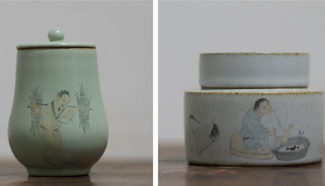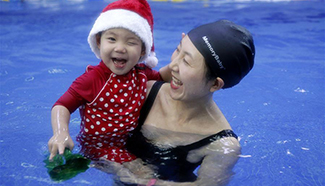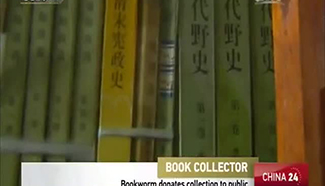KOBE, Japan, Dec. 24 (Xinhua) -- For Chinese immigrants and their offspring in Japan, while they learn the Japanese language and try to fit in here, many of them are still making great efforts to sharpen their mother tongue.
This was evidenced here Friday as dozens of children with a Chinese lineage attended a Chinese speech contest to proudly display the achievements they've made in mastering the language of their home country.
It was the third time for 18-year-old Ren Xiaoning to take part in the contest this year. She came to Japan with her parents when she was only 10 years old, and while she's made a great effort to learn Japanese, she has never forgotten her mother tongue.
"I talk with my parents in Chinese, I read books in Chinese, and I watch Chinese soap operas on the Internet," she said, citing the means she used to improve her Chinese, as she no longer has Chinese lessons in school.
The distance between the second-generation immigrants and their motherland has narrowed greatly compared to years ago, as they have much easier access to the culture and language of the land where their parents came from thanks to the Internet and other technology.
"I'm watching 'Stay With Me' recently," Ren said, referring to a popular TV opera in China. "I don't want to forget my mother tongue. Besides, China is developing fast and I would like to know more about China in the future," she said.
This year's contest has the theme "Starting Point" and Ren talked about the college life that she looks forward to as being a starting point for her new life, which will lead to her career as a successful businesswoman traveling much between China and Japan.
Wu You, a primary student, came to Japan when she was little. Her parents, not wanting her to forget about her culture, entered her into a school that teaches lessons in Chinese, much like in China.
In schools such as the Kobe Chinese School, lessons are taught in Chinese, and teaching materials compiled by the school itself are used.
The school has even attracted many Japanese students who are interested in Chinese culture or want to learn the Chinese language.
For Hu Shiyun, a professor at Kobe Gakuin University, immigrant children face two difficulties when studying their mother tongue: firstly, they lack the opportunity to speak or write the language, when using it is the fastest way to pick up a language; secondly, they don't have conditions that are as good as in China to learn the language.
The "China Cup" Chinese Speech Contest, launched in 2007, has been held annually since then, aiming to provide a platform for young Chinese in Japan to showcase their Chinese-speaking skills and encourage them to make more efforts to learn the language of their home country.
"The speech contest gives children a platform to exhibit their achievements and encourages them to learn more. Many of the students even spend several months making preparations," said Hu Shiyun, one of the founders of the contest.
"The children are enthusiastic about their mother tongue. For one thing, they have their roots in China, and their families encourage them to remember that. In addition, the Chinese economy is developing rapidly. Hence, mastering Chinese also means grasping the key to open the door to China's vast market," he said.










